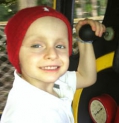Leveraging Zebrafish to Discover Collaborating Oncogenes in ALL

Mentor Name: David Langenau
Leukemia is the most common form of cancer amongst children and teens, making up nearly a third of all childhood cancer cases. T-cell acute lymphoblastic leukemia (T-ALL) is a rapid-progressing and aggressive disease of the white blood cells that normally protect the body against infection. When pediatric leukemia patients experience relapse, the drugs that initially were able to treat the primary disease are generally unresponsive. The biggest hurdle to more effective treatments for T-ALL relapse is a limited understanding of the molecular pathways that allow the diseases to survive and return after treatment. While the exact cause of many pediatric leukemias is unknown, most forms of T-ALL are not inherited and instead result from unusual activation of normal genetic programs. Our lab uses innovate pre-clinical zebrafish models to study T-ALL and identify fundamental properties of the disease that can be potentially targeted in the clinic. Zebrafish are well suited for cancer discovery because the molecular programs that drive tumor growth are remarkably conserved across evolution. Here, I will use pre-clinical zebrafish ALL models to overexpress combinations of key human genes known to be expressed in ALL patients. This will serve as a screening strategy to mimic the molecular conditions seen in human pre-leukemic ALL patients and identify genetic combinations that can collaborate to initiate leukemia. My work will develop a more complete picture of the genes and pathways that drive drug resistance and enable leukemic cells to survive and ultimately lead to relapse.

